“Can You Hear the Music?” UCLA’s Royce Hall Sure Did at Ludwig Göransson’s ‘Oppenheimer: Live in Concert’ Experience
- Oops!Something went wrong.Please try again later.
- Oops!Something went wrong.Please try again later.
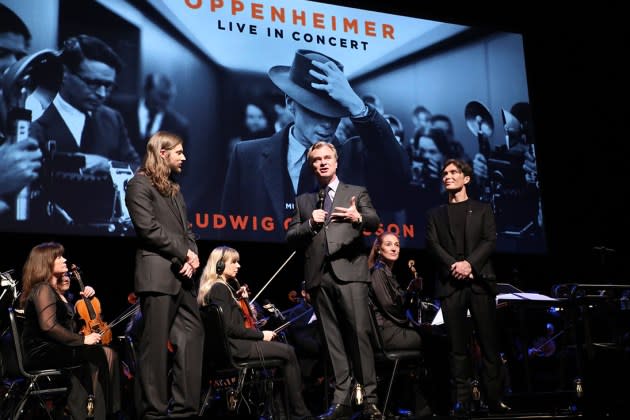
Last night at UCLA’s Royce Hall, nearly 1,000 lucky attendees got to hear the music that defined the cinematic event of 2023, Christopher Nolan’s Oppenheimer.
Following warm introductions from Cillian Murphy and Nolan, Oscar-winning composer Ludwig Göransson and his partner in life and music, Serena Göransson, produced a live-to-film experience of their Golden Globe-winning and Oscar-shortlisted score for the $955 million-grossing historical epic. The duo were joined by conductor Anthony Parnther, who led the evening’s 55-piece orchestra, featuring many of the same musicians he also conducted during the score’s original studio sessions.
More from The Hollywood Reporter
People's Choice Awards Nominations: 'Barbie' Leads Film Nods With Nine
Taraji P. Henson Praises Oprah at 'The Color Purple' Screening: "She Was There Holding Our Hands"
Together with Universal Studios, Syncopy and the event-related services of Black Ink, Fine Line and Encompass, the Göranssons dedicated the entirety of the past two months to Oppenheimer: Live in Concert. They painstakingly rearranged their two-hour and 43-minute score, so that it could be played live in continuous fashion, with the exception of a musician-friendly intermission at the film’s two-hour mark. During his opening remarks, Nolan stressed that they made “an unplayable score, playable.”
“We pretty much had to reorchestrate almost the entire film,” Serena Göransson tells The Hollywood Reporter. “There’s a whole process between the recording sessions and what ends up in the picture. The score is not perfectly recorded to the final version of the film and laid in.”
Less than a mile away from the concert’s Royce Hall venue is Kerckhoff Hall, which stood in for 22-year-old J. Robert Oppenheimer’s (Murphy) University of Cambridge setting in the opening minutes of the film. This is the location where Oppie poisons his head tutor’s apple, and as he tries to undo his vengeful act, he meets visiting physicist Niels Bohr (Kenneth Branagh), who goes on to ask, “Can you hear the music, Robert?” This question sets up an invigorating montage to the sound of the film’s signature cue, “Can You Hear the Music.” The indelible theme has become a phenomenon in and of itself, garnering 2.1 billion impressions on TikTok and 60 million-plus streams across all DSPs. The entire soundtrack has now totaled more than 200 million streams.
However, the fluid tempo of “Can You Hear the Music” posed many challenges during its recording and eventual live performance.
“[Serena] suggested giving the musicians a click [track] in their ears while they’re still playing the old tempos. They’d get one bar of new clicks in their headphones before it happens on the page. I didn’t think it was possible,” Ludwig Göransson admits. “For the concert though, we took it a few steps further. It evolved beyond that,” Serena Göransson adds.
Fresh off of five Golden Globe wins including best motion picture, drama; best director for Nolan; and best original score for Göransson, Oppenheimer is now considered to be the Oscar frontrunner.
Below, during a conversation with the Göranssons on the morning of their big event, they also discuss why they didn’t perform onstage, opting instead to oversee the entire production.
First off, congratulations on a big night at the Golden Globes. Was there a highlight from your night that we may or may not have seen on TV?
Ludwig Göransson: The highlight was definitely just watching Chris go up onstage and give that beautiful speech for best director.
Serena Göransson: After all his love and dedication to this industry, to see him be recognized for the first time was very emotional.
The way he went from a touching moment involving Heath Ledger and Robert Downey Jr. to a comedic one involving Downey was so well done.
Serena: And I don’t think he planned anything!
Ludwig: Yeah, it was just in that moment of catching eyes with Robert.
Did the two of you dance the night away, or did you bow out early since this is a big week for both of you?
Serena: We weren’t planning to go to any parties, because we had our first rehearsal with the principals of each section of the orchestra the next morning at 9 a.m. But it was such a beautiful moment that we had to celebrate with Universal.
A lot of people complained about the long, circuitous walks to the stage, but I didn’t mind because we got to hear your score a handful of times.
The Göranssons: (Laugh.)
Ludwig: I actually thought about that. Maybe I ran up to the stage too fast.
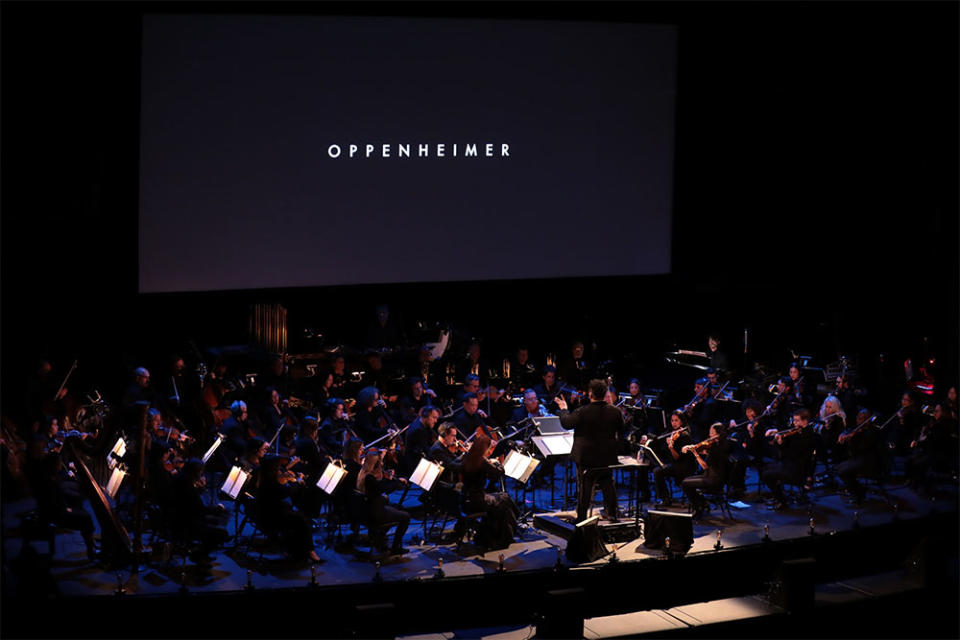
So by the time people read this, you will have completed a live-to-film performance of your Oppenheimer score by way of a 55-piece orchestra at UCLA’s Royce Hall. How challenging has it been to pull this off alongside the movie?
Ludwig: It’s been very challenging, but we all feel fortunate that we’ve just been focused on this for two months. We’re not on any other project right now. We’ve just been focusing on the live show, and reorchestrating and rearranging the music from the way it is in the movie, so that it can be played in one continuous performance.
Serena: We pretty much had to reorchestrate almost the entire film. There’s a whole process between the recording sessions and what ends up in the picture. The score is not perfectly recorded to the final version of the film and laid in. Sometimes, it happens that way, but the way Ludwig and Chris work together, the music is being worked on as Chris is shooting and editing.
Ludwig: It’s constantly massaged.
Serena: And constantly changing.
Ludwig: So we had to take that latest version of the score from the dubbed film, the theater release, and get it on sheet music and in one book, all two hours and 43 minutes of it.
Serena: And that’s not what the [original] sheet music is. The last version of each cue is a snapshot in time. It’s a moment in time in the middle of a very long and detailed editing process. So if two seconds are cut [from a cue], it has a ripple effect in the score.
Considering that your score often sits underneath the dialogue, has the sound mixing been a big point of emphasis for the event?
Serena: Absolutely, but at the same time, it’s impossible to re-create that exact experience. It’s a very dynamic score. You’re moving between a cello solo and a really loud tutti section where the whole orchestra is playing, to a very quiet violin solo or duet, to horns blasting or a solo piano or solo harp. So it presents a challenge for our mixers, Fred Vogler and Chris Fogel. Chris actually recorded the score and mixed the score for the film, and Fred is a brilliant live mixer. So the two of them are working in tandem tonight to make sure that everything is highlighted the way that it’s meant to be.
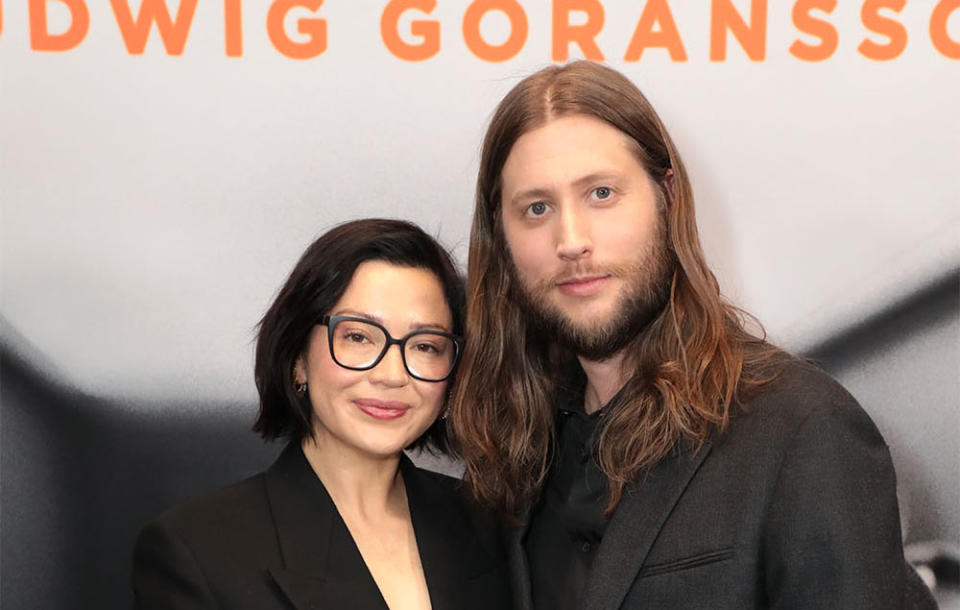
Are the two of you going to pick up any instruments tonight?
Serena: We really wanted to play this concert, but it’s sort of impossible to do that and then also keep an eye on all of the elements that we need to be on top of.
Ludwig: During the rehearsals, we found it was more useful for us to be listening and writing down all the changes.
Serena: And we’re constantly working with Anthony Parnther, the conductor.
Ludwig: He also conducted the recording sessions. Normally, when you do a live-to-picture concert, it’s years and years after the movie comes out, but this movie came out six months ago. So, along with the same conductor, all of the musicians that played on the recording are also playing the concert, and the music is still very fresh in everyone’s minds and bodies.
Serena: There is the element of endurance and stamina for this concert. It’s a three-hour film, and there’s about two hours and 45 minutes of music, so it’s wall-to-wall music. And within that, the music and the dialogue dovetail in a pretty intricate way. So it was hard to find a place to do an intermission. There’s only one real place where you can take a break, and it’s almost a shame to pause the momentum and pacing that Chris and [editor] Jennifer Lame worked so hard to get right. [Writer’s Note: The intermission took place right after Emily Blunt’s Kitty gets the call to “bring in the sheets,” signaling a successful Trinity test. The existing scene happened to fade to black.]
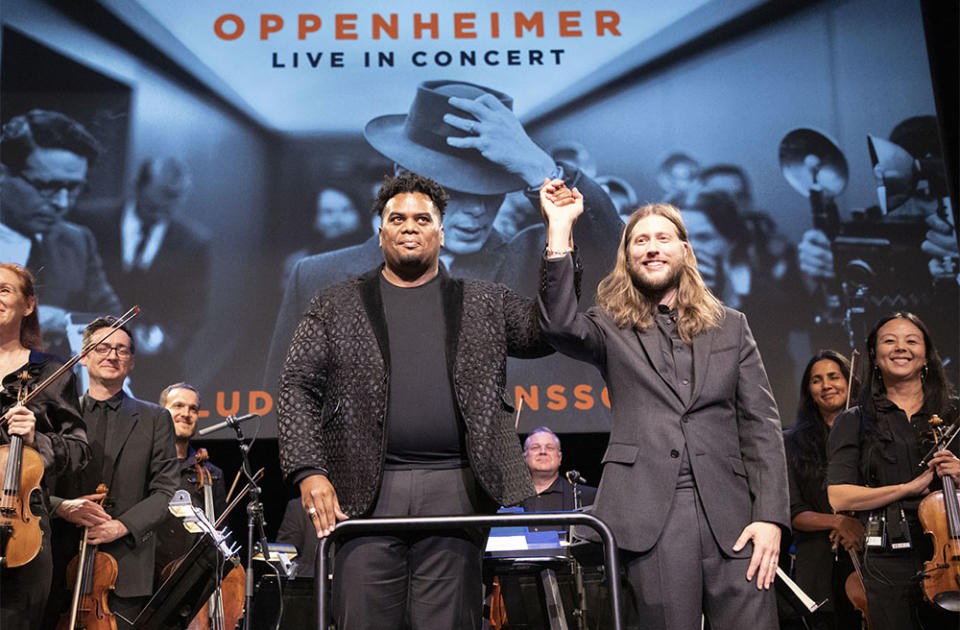
Contrary to John Williams, composers are not always conductors. Was conducting just never a primary interest to you, Ludwig?
Ludwig: I’ve done some conducting. In 2017, I actually conducted a Creed live-to-picture in Prospect Park. But conducting is really like playing an instrument. So I would say that I conduct poorly. I’m not a great conductor.
Serena: That’s not true!
Ludwig: There’s people that can do it way better than me, and they are the ones that I want to be in charge of my music.
Serena: It goes back to the listening. The reason that we’re producing this concert and not playing is so that we can have our ears.
Ludwig: Yeah, you have to really be able to hear and listen for the dynamics between the organic elements and the synthesized and manipulated mono production elements. So you’d miss a very crucial part of my music by just conducting.
Black Panther had a similar event at the Hollywood Bowl in 2021. Did you learn anything specific from that event that you’re going to apply here?
Serena: Well, that was a different thing. We were very happy to go to that concert and see Ludwig’s music celebrated, but we’ve always wanted to do a concert where we really had creative control. And when Universal initially presented the idea of doing this concert, we were a little nervous and a little scared. But it’s a dream come true to have this opportunity with the full backing and support of the studio, and to do it at a venue where Chris shot some of the movie, with this particular group of orchestral musicians, most of whom performed on the score. The entire team has been great. Fine Line, who were also the copyists for the film, have been going back and forth with us [on the sheet music], and some of the cues have had 24 versions just to get things really dialed in so that it plays down perfectly the first time the orchestra reads it. Black Ink, the production crew, is running the whole thing, and Encompass is handling the timing because it is a long film. So everything has felt so collaborative, thoughtful, and really positive, and we’re really excited about tonight.
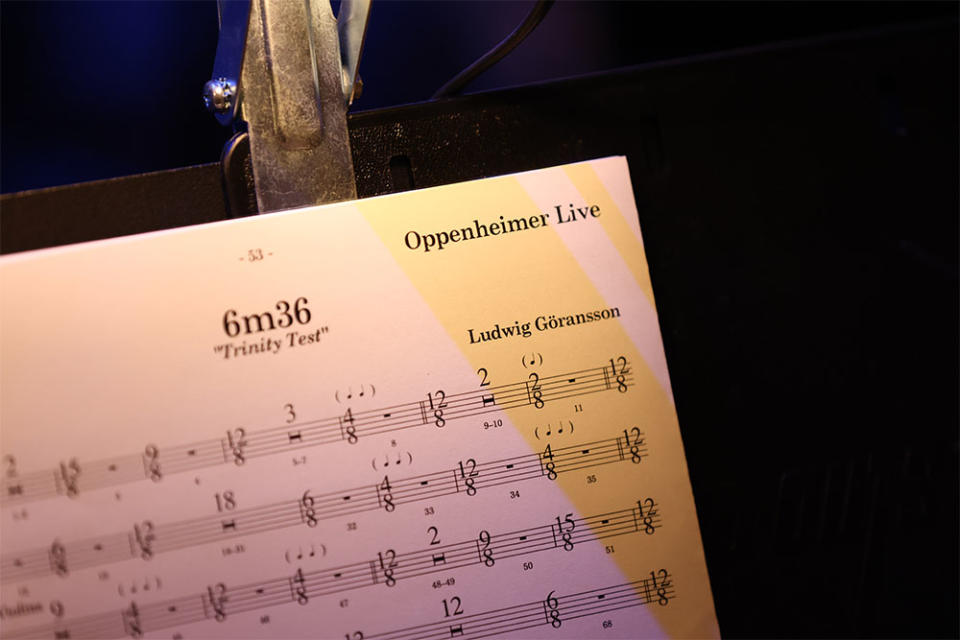
On first listen, “Can You Hear the Music” reminded me of my music theory class in college and the scale exercises my teacher had me do. With scientific theory being a huge component of the film, did you purposefully try to incorporate a clear example of music theory to interact with it?
Ludwig: Absolutely. You’re a hundred percent right. I obviously wanted to focus on the emotional aspect of Oppenheimer’s deep inner feelings, but I knew that it was crucial to get the science and the math in there as well. So I was so excited to see how I could combine those two elements. That’s why “Can You Hear the Music” starts off with a six-note scale, a hexatonic scale. So it did sound like an exercise in the beginning, but through a lot of time and experimentation, I made this a mathematical equation with tempos and tried to infuse an emotional aspect as well. Serena actually came up with a really awesome way to have the orchestra play it live in one continuous take.
Serena: That was the only way it worked, and it’s so fitting given the point that this cue appears in the film. The tempo changes turn on a dime, and while we tried recording it in sections and splicing them together, we needed real musicians to do these tempo changes.
Ludwig: Yeah, the other way didn’t sound human. So you suggested giving the musicians a click [track] in their ears while they’re still playing the old tempos. They’d get one bar of new clicks in their headphones before it happens on the page.
Serena: We’ve never had to do that in the studio before.
Ludwig: I didn’t think it was possible.
Serena: Some of the musicians felt the same way, but most were up for the challenge. So that was the only way we got that cue recorded, and that’s what you hear in the film. For the concert though, we took it a few steps further. It evolved beyond that, and it’s a little more comfortable for everyone.
The film doesn’t move like a three-hour, dialogue-heavy historical drama. It feels like it has the same engine as Chris’ action movies, largely because of your score and Jennifer Lame’s editing. Did Chris ever explicitly say to approach a dramatic dialogue scene like an action movie?
Ludwig: It was very close to that for the third-act courtroom scene. I remember Chris was about to start cutting that scene with Jennifer Lame, and the first edit they had was maybe 30 minutes. I don’t know if he actually said “an action cue,” but he said that we needed some music for the third act that had very, very high intensity. I read the script, but I didn’t have the actual scene in front of me at the time. So I wrote a 30-minute piece of music with this fast tempo and high intensity, and he started cutting the third act to that piece of music. When he sent it back, it was a 20-minute scene with my music to it. So I watched the scene, and I rewrote the music again, and then I sent it back to him. He then cut it down to 14 minutes or something.
Chris usually has his composers begin writing before cameras roll, and it clearly gets great results, something your Oppenheimer and Tenet scores prove. Is it rare to have the time to do this on most other projects?
Ludwig: You need a relationship with the director, and it also helps when the director is the one who writes the script, because they can give you a heads-up about what they’re doing. It helps when you have an artistic partner and a director like Chris, who understands the importance of music and that the only way to really make something great is to devote time to it. So I feel very lucky to be working on projects where I’m given the time to experiment and make something that feels new and challenging to me. When Chris is in preproduction months before shooting, that’s when we start to work. We meet up every week and we talk about music. Then I’ll start writing music for the movie, and when he completes his first director’s cut, there’s no temp score in it. It’s all our music, and that makes a huge difference to the whole process.
Chris’ starting point was the violin. Serena, as the violin soloist on the film, did you receive word about this note fairly early?
Serena: Yes, there was a lot of Ludwig saying, “Can you record this for me?” And it would only be four notes, but we would do it over and over again in slightly different ways, with slightly different timing, dynamics and mic levels. So Ludwig would then get to work, and I would come in every now and then to record something for him. But I was really surprised by how many of those original ideas they used.
Well, good luck tonight!
Serena: Thank you. Mathematically, it’s been so complicated. lt has been one puzzle after another to solve, but getting to do it with all of our musician friends has been so fun.
***
Oppenheimer returns to Imax 70mm theaters Jan. 12.
Best of The Hollywood Reporter

